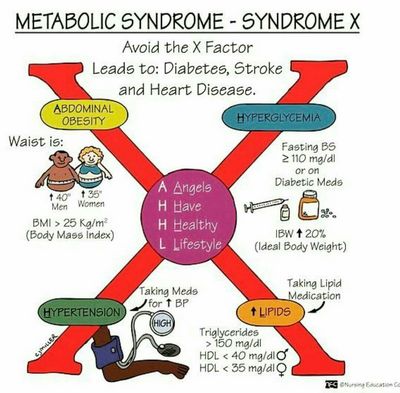Metabolic Syndrome is the term for a set of common risk factors for several health conditions, including diabetes, heart disease, and high blood pressure.

You might have only one risk factor associated with metabolic syndrome, but others may have multiple of these risk factors. When you have more than three of these risk factors, it’s called metabolic syndrome. It occurs when your body is functioning inefficiently or not as well as it should for the type of activity that you do.
Metabolic Syndrome is a combination of many factors that come together to affect the way you work and live. It causes you to become obese and overweight, increase your risk of heart attack, stroke, and diabetes. It also makes it difficult for your body to make the hormones needed to regulate insulin and cholesterol levels. When it affects these two vital bodily functions, you can experience all kinds of medical conditions, including heart disease and diabetes. If you want to avoid metabolic syndrome, you need to learn how to control all of the factors that are affecting your body.
Metabolic Syndrome can be treated and is one of the best ways to help your health. If your weight is becoming a problem, then you can try to lose weight by modifying your diet. By reducing saturated fat, cholesterol, saturated and trans-fats, sodium, and alcohol, you can reduce your chances of developing serious medical conditions like diabetes and heart disease.

Make sure to get plenty of exercise, too. Try to find a way to incorporate both healthy eating and moderate physical activity into your daily routine.
Metabolic Syndrome can affect your brain, too. Studies have shown that those who have diabetes have decreased cognitive function. Those who are overweight also have reduced mental function and memory, but their mental function is less than it would be in a normal weight category.
To maintain a healthy weight, be sure to watch your caloric intake. Eating the right kinds of foods, such as fruits and vegetables and lean protein can help you reduce your chance of developing metabolic syndrome and other chronic health conditions. If you’re obese or overweight, you need to know your body’s metabolism so that you don’t over consume calories that you don’t need. orze off. This can cause you to gain weight and increase your metabolic syndrome risk.
If you have diabetes, make sure to keep your glucose level in check. A glucose level in your blood can fall very low and cause your body to function inefficiently. If your glucose levels get too low, your body may experience a surge in blood sugar, causing your heart rate and blood pressure to increase.

If this happens, your body’s ability to produce insulin, which is part of your body’s immune system, is diminished. This can cause you to have a higher risk of getting infections, develop certain cancers, and develop other health complications.
In order to prevent any of the complications associated with metabolic syndrome, you need to learn to manage your overall health. If you eat properly and exercise regularly, your body can keep your glucose levels steady, making it easier for your body to control the insulin and cholesterol levels it needs.
Diabetes mellitus, high blood pressure, and high cholesterol can all cause you to develop serious medical conditions and should be monitored by a physician. Be sure to check with your doctor if you think you are having any symptoms of one of these conditions.
Another way to prevent yourself from developing serious complications of metabolic syndrome is to avoid taking in alcohol and caffeine. They can reduce the insulin in your bloodstream, increasing your risk of having the condition. Alcohol and caffeine are also known to raise your cholesterol level and increase your likelihood of developing cardiovascular problems. It is also recommended that you stay away from processed foods and those that contain trans fats. These types of foods can lead to obesity and can lead to diabetes, too.
Lifestyle changes can also play a big role in preventing and managing your condition. Smoking, alcohol consumption, and exercising less can all help you achieve and maintain good health and lead a long, happy life.
If you want to prevent yourself from developing the effects of metabolic syndrome, it’s important to find ways to manage your diet and take care of yourself physically. Take the necessary steps to keep your glucose levels in balance, maintain a healthy weight, and remain active.